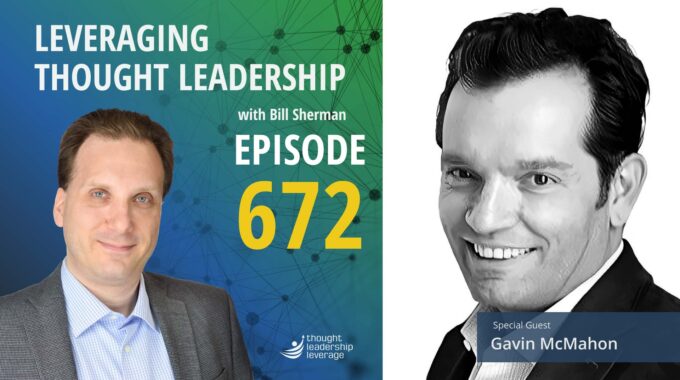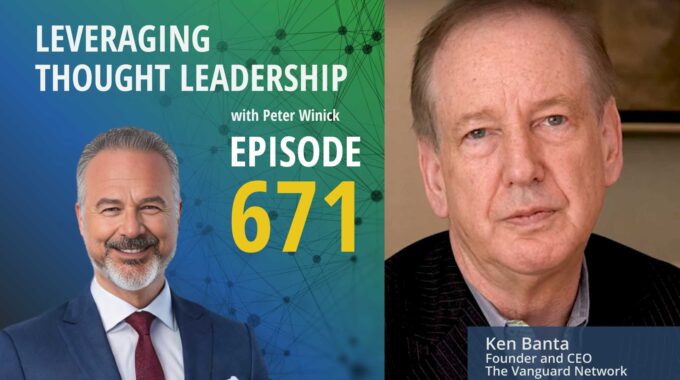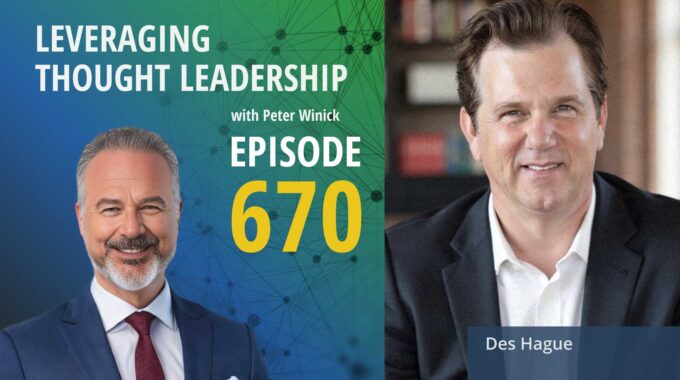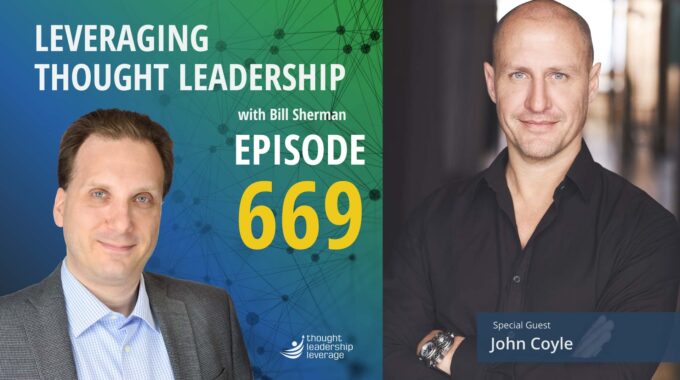How Storytelling Turns Smart Thinking into Real Influence Great ideas don’t win — great stories…
Leveraging Thought Leadership With Peter Winick – Episode 83 – Jack Daly
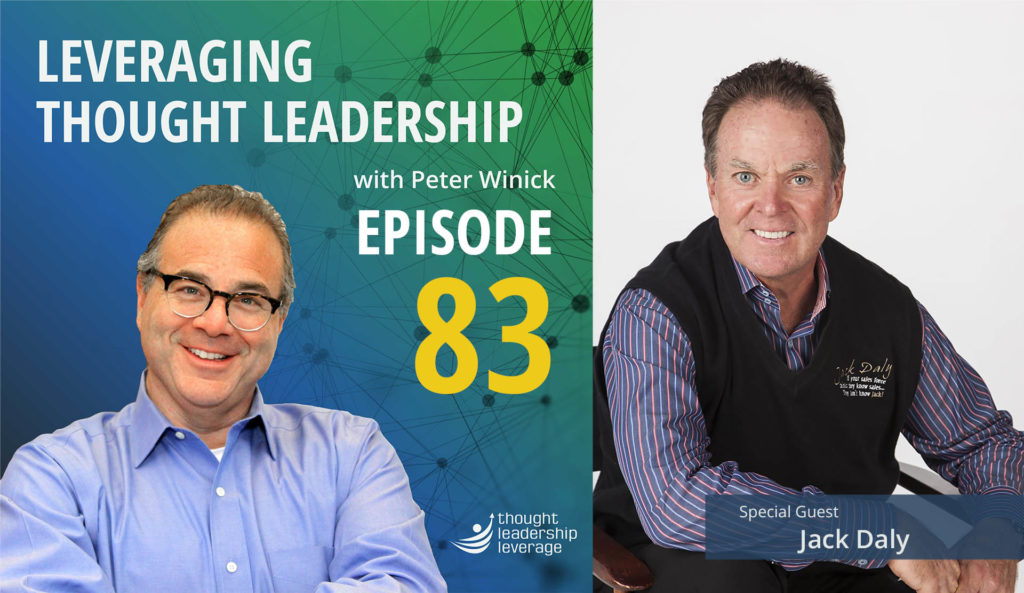
Technology has changed the world, bringing interconnectivity to a new, global high. Still, there are basics of selling that will never change – and you need to master them to succeed!
Our guest in this episode is Jack Daly, a leading sales speaker with more than 30 years of experience. He’s also the author of two best-selling books: “Hyper Sales Growth” and “The Sales Playbook”. Join us as Jack and Peter discuss finding your personal clarity, how to use the internet to get more business, and why we all need assistants from time to time.
If you need a strategy to bring your thought leadership to market, Thought Leadership Leverage can assist you! Contact us for more information. In addition, we can help you implement marketing, research, and sales. Let us help you so you can devote yourself to what you do best.

Transcript
Peter Winick And welcome, welcome, this is Peter Winick. I’m the founder and CEO of Thought Leadership Leverage and you’re joining us on the podcast today which is Leveraging Thought Leadership. And today my guest is a very special fellow, Jack Daly. Jack is a leading sales speaker. He has traveled the world speaking for over 30 years. He’s an author, he’s a key noter. And then he also goes by Iron Man Jack because I don’t know that I’ve ever met anyone that has played in 93 of the top 100 golf courses. what is it, 93 marathons in 49 states and of course 15 iron men. So he’s definitely type B, he’s mellow, not very goal-oriented and probably shouldn’t take his advice because he’s been doing this a long time and knows what he’s doing. But welcome aboard Jack, thank you for joining us. Here.
Jack Daly Thanks, and I had to laugh because any time anybody uses numbers of things that I’ve done Somewhere along the way they got dated because there was 24 hours in between And today so it’s actually 95 marathons in all 50 states and all seven continents and the golf courses are near approaching 100. So we’re good
Peter Winick Well, maybe you can finish a round of golf by the time this interview is done. That would be so anyway, Jack, you’ve been at this. So you had a great career professionally, right? And then transitioned into sort of this wacky world of content and thought leadership and all that. And there isn’t a guide book, right. So if you wanted to be an accountant, there’s a linear path that you do. And you take your CPA, you want to be a financial advisor, whatever. How did you sort of, you know, chart your own course here and figure this out?
Jack Daly Well, it’s a great question, and there’s more than one route, as you know, to take. Uh, so I, I, uh, I’m going to go all the way back to 13 years old. At 13, I knew I wanted to be a business owner because at 13, I had built my first company and five employees. So I wanted it to know as an adult how to do that. And I interviewed 200 successful business owners over the summer of my 13th year.
Peter Winick Wait, wait, wait. So you’re a 13-year-old tracking down business owners asking questions.
Jack Daly Yeah, yeah, I spent four hours minimally with each guy. Now, taking that same approach, I just, you know, I went off in between the age of 26 and 46, I built six companies from scratch into national firms and I used this similar type of model. When I lost my passion for what I was doing, which was running and building companies, I retired, quote unquote, but I’m not a retiring guy is the stats that you introduced me with are. I then said, well, what am I going to do? Well, people kept asking me, how did you do what you did? How did you what you do? And I had hired a speaker to travel throughout one of my companies. And I went everywhere he went. And I fell in love with what he was doing and how he was going it. And I said to him, someday, Jim, I’m going to what you. And he said, if you’re ever serious, call me. I’ll drop whatever I’m doing with whoever I’m doing it with to do it with you. So my entry at 46 years old into the speaking business was buckling up with someone who’d already been there, done that, and serve at the, and kneel at the altar of the master. You know, that’s a great story, Jack, because I think a lot of people this is somewhat of a lonely business, right? You could either try to figure it out on your own. And I think, you know, going to other folks that have achieved things that you aspire to achieve, and asking them how they did how they Did that and what you could learn from them. I think most people will be surprised how open people are to helping and having you shepherd them and giving you some guidance and advice. So you learn you learn from a master. And then you’ve got to sort of do the math on this thing and figure out what’s your business model. Cause there’s lots of business models. And I would argue that when you started at this thing, 30 years ago, the models were a little bit different in terms of open enrollment, in terms of there wasn’t digital, et cetera. So give me a sense of the models that you chose to jump on, you know, back in the day when you start it. And one of the things I always admired about you is you’re constantly evolving and changing to keep up with the changes in the way people consume content and ultimately want to pay you. It’s a bit.
Peter Winick Tell me a bit about that.
Jack Daly Yeah, so the first order of businesses, if you’re not passionate and committed to doing this, take a pass. You better be prepared to get your ego out of the way. I left an environment where I was making seven figures plus a year and had chefs on my premises and chauffeur driven limos and jet set to call. All of that, I left, and in my first year, breaking my ass. as a speaker, I made $50,000. And a funny story was, it took me a few days of working 18 hours a day and then going down to the garage to get into my car. And then after two minutes of sitting in the back seat, realized that if I don’t get in the front seat, the car is not going to go anywhere. Thank you very much. And so I’m now running a copier and doing all kinds of crazy things. It was a humbling, get your ego out of the way type of thing. And there isn’t anything called an overnight success. So there was, and even though I buckled up with a guy that was a legitimate spar speaker. you still have to go build your business, and you need to figure out the routes of going and building your business. For example, as a speaker, one of the things that I do is I conduct open to the public events where we sell people seats. That business is a very different business model than if I go to the corporate world and say, I’ll teach your salespeople how to sell better than anyone else. they put their 100 or 200 salespeople in a room with me for a day and pay me a fee.
Peter Winick Well, which route do you think might be easier, selling one guy and putting 200 people in the pocket to go to an event. Well, it’s a totally, I mean, you’re giving them in essence, the same experience, but the underlying business model, the marketing, the sales, the customer service, that, you know, all the logistics, totally different game. And obviously you chose early on the more difficult one from a logistical and sales and I guess every perspective.
Jack Daly Yeah, and so then when you look at it, then you have to say, well, there’s what I’m going to call a talent pool agency out there. There are speaker bureaus, meeting planners, and they have relationships with people that would hire you, but then there’s a cost to that. They’re going to take a 30% cut, for example. Spinoff business, out of your events, they’ll take a cut on that. you have to compete with the other speakers that they might represent for your gig. Or you can go another route and develop it yourself. So as an example, I chose the latter. And I said, I’m going to leverage what I’m gonna call centers of influence. And where do the people that hire me to put their 200 salespeople in a session, where do they aggregate? Where do they get together? Where can you find them? So YPO, Young Presidents Organization, Vistage, EO, Entrepreneurs’ Organization, CEO Global, Council of Growing Companies. And so if I could get a seat at the table, if I can speak to a YPO chapter in Washington, D.C. with 200 CEOs and speak for a couple hours and convince them this guy has talent and value to their organization. Well, maybe 10 of those people will then raise their hand and say, I’d like to talk to you about something, and maybe seven of them hire me. And if I could build my reputation amongst these organizations with 10,000 plus members and become one of the chosen ones in the field of expertise that I speak in, then I will have done what Jim Collins calls building your flywheel. 30 years later, my flywheel is spinning almost out of control with opportunity.
Peter Winick Well, and those are the dividends, because what I was going to say is, so you’ve got the flywheel, which is paying you dividends for 30 years of hard work, and then the world has largely moved, not exclusively, from an analog to a digital play, right? So now where you had to find the right 28 people or 312 people in Kansas City on November the 11th when you’re going to be there, and that’s somewhat limiting and difficult and weather-related. There’s all kinds of variables that can get into that, but now you can, A, find people digitally, and you can deliver some of your solutions digitally as well, or at least handle the marketing there. tell me a little bit, because a lot of people struggle with this, how you blend both, because you have what I would call a multi-modality model. You do coaching from a distance, but a lot of your stuff is still face-to-face, but how do you use the marketing on the digital side and layer that on top of an analog delivery model?
Jack Daly Yeah. Well, as you know, uh, I have a phrase as many speakers have many, many phrases. One of mine is if you don’t have an assistant, you are one. There are things that you need to be done, but not necessarily done by you. Um, and so, so I have combination of, I’m going to let’s, let’s talk about leverage of the internet and social media as an example, I have an outside firm. who professionally is building our game plan and executing on a portion of it. And then there’s a portion of that game plan that they have designed for us that my assistants do. And they’re virtual assistants and they all have different functions and do different things. But here’s the beauty of it, I personally may have one outreach per day on leveraging the internet and social media, me personally. And usually, it’s photos of me out running a marathon or doing all the crazy stuff I do. And it opens the world to me as a person. But when I’m in front of an audience for a full day of sales training, I tell them by about the hour of 4 o’clock in the afternoon, I have been present at least 10 times every in some mechanism out there in the social media and the internet. But I only played once, if at all.
Peter Winick Right, so the proverbial I is, you’re not sitting around all day on Twitter and LinkedIn and all that. That’s number one. Maybe you might post something interesting. Here’s a, I just finished a marathon or having a great war with a friend or whatever the case is. But the other piece that you said that is fascinating is, there’s things that you can do and things that can’t do and you’ve extrapolated that to your organization. So in some instances, you’re going outside of your company, right, and your assistants and the folks that you bring on board to say, you know, we’re not the best at social media strategy. Let me go find somebody that’s really damn good at that. show us how to do it, give us the help that we need. There’s pieces of that that we can implement and execute, and there’s people that, that’s what those folks do all day, they’re smarter than us, so let’s just pay them a premium and learn from them.
Jack Daly Absolutely, it perfectly stated. And let me just throw another example. I was approached by a magazine publisher to provide content for their magazine. And I was at a trade show and I saw their booth and I stopped and they had a variety of different magazines. And as I was talking to the publisher, I was paging through the magazine and no matter what magazine I was looking at, no matter trade, I had an article in it. And he, and I said, man, this is really cool, Andy. I’m in, I’m, in all these magazines and, uh, and I sort of don’t even know it because one of my assistants is repurposing my content and providing the content to the magazines. Right. And I, and he goes, yeah, that’s all happening behind the scenes on your deal, but you’re, you’re prominent all over the world in these magazines. And then I paused and said, shall I have a magazine? Yeah. You ought to have a magazine. And I said, well, give me the specs on it. And that was two years ago. And today, I publish a magazine that’s 32 pages twice a year. And it’s got another eight Thought Leaders contents in there with my content. But I’m out with a virtual magazine on my website at jackdaily.net. And I’m also out with over 10,000 copies every six months of a new paper-bound magazine that That is… promoting Jack Daly and quite frankly, I’m not doing much with
Peter Winick So you went from not knowing that you’re in lots and lots of magazines, to knowing that your in lots of lots of magazines to saying, geez, I might as well be a magazine. Right? So that’s pretty, pretty cool. Absolutely. One of the things that you touched on there was, most people would say, well, listen, this guy, Jack is in a whole bunch of magazines, and he actually publishes a magazine, geez he must be spending a lot of spending a lot of his time developing and crafting and creating the content to do it. But you mentioned repurposing, right? So given that you’ve been doing this for 30 years, you’ve got a lot of stuff. You’ve said a lot things, you’ve archived a lot of things, and it’s not like you have to wake up every day and come up with new stuff. You do to stay fresh, but from a marketing perspective, tell me about how you develop systems and processes to effectively repurpose the content that you know resonates with people.
Jack Daly It’s a great question. One of the things that I’m asked about the sales world is with all the technology that’s taken place, is it a different world out there? And the answer is yes and no. Yes, it’s a different road out there because of the internet and social media. And there are things in sales today that… The old way of selling, bringing your wares out in briefcases and showing the prospect of your product and your service and brochure, all of that we can do from our desktops. So the role of a salesperson is very different because of the internet and what we’re able to leverage there. However, there are basics of selling that will never change. People do business with people they like. the selling is the transfer of trust, all of those basic principles. So when you are building content over the years, which I have a 30 year plus content intellectual property base, there all we need to do is harvest it. All we need do is take a look at it and say, where are the relevant pieces of our content that we’ve got? And then somebody do a draft for me of my six assistants And then I just look at the draft on an airplane. and add some color to it that brings it up into today. That takes me all of 30 minutes, and all of a sudden we have an article for the magazine. Yep, and I think most people, you know, don’t, they stop thinking like business people when it comes to content. And all you’ve done is figured out what is the most efficient way to create a deliverable, right? And you’ve used what you have. If you were in the real estate business, you would use the assets that you have at your disposal. And I think a lot of thought leaders and authors and speakers say, well, you know, I’ve got to just keep grinding it and create, create, create, and create. And they don’t stop and see, where can I take advantage of the assets that I’ve built? I gotta interrupt you here, let me be sure to tell you something here. You and I, I don’t know whether you remember, but you and I first met when I was thinking about writing a book. That’s where I was going to go next. Yeah. And we met for a full day up in the Bay Area. Yep. And when I left, I was extremely charged up. I had an agenda of things that I was going to do. And when got back after a couple of weeks, I was exhausted and just said, you know what, where I am in my life right now, I’m not ready for this, and yet. I now in the last three years have published three books in three years and each one of them ended up becoming a number one best-selling business book on Amazon and two of them were picked up by Forbes. How did that all happen? Well that happened by a variety of things. One is I’ve leveraged my assistance so I am now only working on the highest payoff activities for me. And I don’t do a lot of the things that other speakers are doing. I’m not running things up when people buy things from my website, I’m not running them down to UPS to be the delivery processing payments. I’m, I not sitting at a computer on building PowerPoint slides. I mean, those things other people can do, right?
Peter Winick You don’t have the swipe device on your iPhone to sell a book for nine bucks in the back of the room? Yeah, yeah.
Jack Daly I ran a $23 billion bank and all of a sudden I’m now a cashier, it doesn’t make any sense. So when I freed up my time to work on the highest pay off activities, then all you need to do is something very, very basic. And that is this, if I’m going to write a 14 chapter book, and I did my outline and said it’s 14 chapters, and each chapter is going to be, let’s say, somewhere around 20 pages, well, I then say, well let’s just do a chapter a week. and 14 weeks later, I have a book. Exactly. And doing one chapter a week, could you come up with 20 pages of quality content based on 30 years of reservoir of good work and couple it with the fact that I read somewhere between 25 to 40 books a year and I’m attending conferences all over the world, not just to speak, but I stay there and listen to the other speakers. Could I figure out how to add some value with my book between what the core competence is, what historically I’ve taught, and then freshen it up and get 20 pages out of me each week? That’s probably a couple hours.
Peter Winick Yeah, no kidding. No kidding.
Jack Daly One of my books, like four years later, it’s still selling like crazy and the book literally took me about 40 hours.
Peter Winick of actual work. So let’s talk about that, though, because I remember you and I started working together probably at least 10 years ago, right? And I think I sort of, I don’t know, scared you or talked you out of the book or like now wasn’t the time because it was one of these things where, well, everybody else is doing it. So I think, I need one. And I said, you know, there’s a time and place for it.
Jack Daly At that point in time, you did me a great, great favor. You gave me clarity, and that’s what people need.
Peter Winick It’s funny that you say that, because when people say to me, well, what am I going to get out of working with you? It’s a lot of money. I say two things. You’re going to get clarity, and from clarity comes the ability to effectively prioritize all the things you could do, would do, should do, might do. So let me move to the book thing. So now at the point in time that Jack decides to do a book, Jack’s going to do it in a Jack way, which is highly effective, highly efficient, and you play to win, right? So you’re not going to be schlepping these in your trunk. You’re not going to be number 3,287 on Amazon. You’re going to leverage the resources that you have in terms of loyal followership that you’ve been feeding great content with ongoing basis, even though they, you know, you might’ve only met them once or twice, you partner with advantage and then you move to Forbes book. So you go through the book process. Give me a sense of sort of the, the benefit, right? So you told me you were able to do it quickly, 40 hours. It’s impactful. It’s a result of the things you’re doing, but sort of the, so what, what’s been different for you as a result of having a book in the marketplace in terms of doors opened and all that sort of stuff.
Jack Daly So we could give, this is a whole podcast about itself, but here, let me dice it down. I can make it as simple as this. We had a guy call and hire me to speak to 2,000 people that he puts a conference for on every year. And so we wanted to know if he or someone in the organization had heard me speak before. The answer was no. The CEO found my book in a bookstore, read it. I loved it so much that he bought eight more books for his direct reports and told them to read it. And then six months after that, they’re brainstorming on who to have as their speakers for the conference. And somebody said, how about that guy that you bought the book for us all? And he said, absolutely perfect. I got a $30,000 hour and a half speaking gig in front of 2000 people in Atlanta by a client who put me in front of their group who had no one had ever done the due diligence. to see me speak before.
Peter Winick That’s amazing.
Jack Daly And so if you want that one gig, if I wanted to just isolate that at one gig paid for the book.
Peter Winick Right. Well, I would probably say you probably did 10x that from the follow on business and the relationships that were built at that event.
Jack Daly Absolutely, but here’s the funny part. My style of speaking is the same. My content is fairly intact. And yet, until I wrote that book, Hyper Sales Growth, I was not invited on stage to speak at the same conference with Richard Branson. Now, I’m headed back in the first quarter of this year to Copenhagen for my eighth time in the last three years with Richard Branson. And the last time was earlier this year, and we spoke to 3,500 people in Dublin on two back-to-back days. And yet I wasn’t invited to the party, but the book gave me authenticity, right?
Peter Winick your entree into, it’s almost a, I don’t want to say a check the box, but at a certain level it’s expected, right? So you’re not smarter now, the day after you wrote the book than you were before, right. It was just a way to capsulize it in a place. And therefore, when those meetings happen for the 2000 group, someone would say, oh, you read that guy Daley’s book. Yeah. Well, if you didn’t have it, you weren’t even a horse in the race. Thanks for watching!
Jack Daly Exactly right. You know what, within 15 months of having the book published, I was on stage at some point during those 15 months with every single person that’s a shark on Shark Tank.
Peter Winick Wow, that’s amazing.
Jack Daly Pirate to the book, not invited to the party.
Peter Winick You just weren’t exposed to things at that level. That’s great stuff. So we could talk for hours, Jack, as you and I both know, and we have. Unfortunately, we’ve got to wrap up. But before we wrap up, I think I’d be doing the audience a disservice if I didn’t ask you, you know, okay. So I’m Jack minus 20 or 30 years. I’m a young and budding Jack. Not me personally, I’m older than that. What are the two or three things you would tell me? Give me some advice.
Jack Daly The one that I’ve already given as a repeat, and that is, go find people that have already hit the button called success as you define success. And so that’s item number one. Item number two is get clarity for yourself on what life you want it to be. You can be an extremely successful speaker in demand and have what most people would consider to be a terrible life. Um, you know, I, if I want it, I could speak three, 300 times a year without any problem. I’d have a crappy life living in the Marriott 300 nights in around the world, right? Um, 500,000 air miles a year is not something I aspire to, right. But if somebody does, then that’s perfect. So figure out what it is. I challenge all my clients this way, Peter. I want you to draw what the company looks like three, five years out. And what does your company look like as a speaker, as a thought leader, and then reverse engineer it, work backwards, say, how do I get there, right? So get clarity on what you wanna be, find the people that have already filled that, and they will meet. And absolutely, I’ve not had any pushback on people meeting with me. And then the third thing I would tell you is leverage, the word leverage. And when I use the word, leverage, it’s how can I generate more business with less work? How can I make more money with less work? And when I talk about leverage, I talk about centers of influence.
Peter Winick Love it. Well, I can’t thank you enough for joining us today. There’s so much that you sort of filled our time together with in terms of people to learn and unpack. And you know, there’s no, there is no secret to success. It takes hard work. You got to differentiate and the scaling and the leveraging and the repurposing phenomenal. Thank you so much for everything that you’ve shared with us today, Jack. I appreciate it.
Jack Daly Next time in New York, I’ve got to make a point to get together with you.
Peter Winick Yeah. A cocktail or two would be great. Well, thanks so much. Have a great holiday. To learn more about Thought Leadership Leverage, please visit our website at thoughtleadershipleverage.com. To reach me directly, feel free to email me at peter at thoughtleadershipleverage.com and please subscribe to Leveraging Thought Leadership on iTunes or your favorite podcast app to get your weekly episode automatically.


